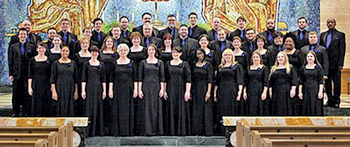by Jane Berkner

In his pre-concert comments, director Samuel Gordon explained his thoughts in creating the program. The concert was titled Always Something Sings, after the closing work by composer Dan Forrest, based on a poem by Ralph Waldo Emerson. Gordon noted that despite the contentious election season we’ve all been through, whether things are upsetting us or making us happy, “always something sings — it’s what I do,” he said.
The program opened with the wonderful pairing of liturgical works, one Baroque, the other modern. The first, a Magnificat by Giacomo Puccini, the great-great-grandfather of the famed opera composer that most of us associate with this name. The other, Introitus, Kyrie and Agnus Dei by Steve Dobrogosz, is an upbeat work in a jazz style.
The Puccini is simple, straightforward, and typical of its era. The choir and accompanying string players gave it a rather bland reading, with a sameness of dynamics, making an exception in their more forceful and dramatic performance of its Gloria.
The singers delivered Dobrogsz’s Kyrie with a great deal of spunk in spite of the mouthful of text that could have gotten in the way of keeping the multi-metric movement jazzy. The change of mood the performers accomplished in the Agnus Dei was particularly impressive, both choir and strings becoming lush and hushed all at once, creating a smoky, ballad-like character.
René Clausen’s simple, yet beautiful setting of poetry by James Agee, Sure on this Shining Night, speaks of kindness, and includes the words “All is healed, all is health.” Here, the group’s strongest performance of the afternoon was unified, controlled and well-balanced, exhibiting a stunning range of vocal colors.
Three Nocturnes by Daniel Elder suffered from a rather sketchy start in the first movement, Ballad to the Moon. Slow pacing made the singers’ navigation of the a capella second movement, Star Sonnet, somewhat clumsy. But in the third movement, Lullaby, Gordon wrapped the ensemble in a tender embrace, caressing the music with an engaging yet understated warmth. Kudos to pianist Amy Sauriol for her delicate accompaniment in this movement.
A strong performance of South Dakota Shadows by Jackson Berkey opened the second half of the program. Presenting tales of the American experience, its five movements are based on works by poets from Missouri. The choir held the quiet, sustained notes in the first movement, “Indian Summer,” with exceptional control. The second movement, “Turkeys and Badgers,” is a hoedown that featured tenor soloist Byron Butler, who burst to the front of the stage with an animated Yee-haw! “Boxing With Snowflakes”, a haunting story of Native Americans in the 21st century, was narrated by Lynn Turner. The last movement, based on the poem Requiem for a Pioneer Mother by Margaret Delaney, was set in a blues style.
Because of occasional pitch problems between the choir and the antiphonal soprano, the final work, Dan Forrest’s Always Something Sings, did not completely hit the mark, though the piece did complement Gordon’s programmatic narrative, capping it with a wonderfully moody end.
In an encore that departed from the topic of the afternoon, we were treated to the opening theme to Downton Abbey by Scottish composer John Lunn, arranged for strings and choir by Samuel Gordon. It was amusing to watch the group perform it with such apparent glee. Throughout the concert, it was a pleasure to hear a vocal ensemble that seems more concerned with the mastery and quality of its sound than with achieving great volume.
Published on ClevelandClassical.com November 17, 2016.
Click here for a printable copy of this article



